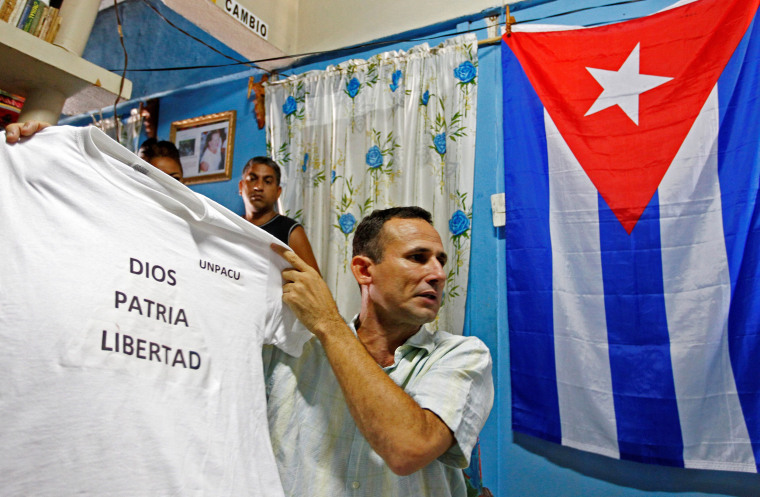MIAMI — The verdict for one of Cuba’s best known dissidents, José Daniel Ferrer, will be delivered March 12, in a case being closely monitored internationally.
Ferrer, 49, was detained Oct. 1 with three other people on charges of kidnapping and assaulting another man. Government officials say Ferrer is a violent criminal, calling him and members of his group mercenaries backed by the U.S. and Cuban exiles in Miami.
In November, Cuba accused the top U.S. diplomat in Havana, Mara Tekach, of working with Ferrer and trying to foment divisions among Cubans.
Ferrer's supporters say that he is a peaceful dissident being held in solitary confinement and that the charges are aimed at silencing him. The United States, the European Parliament, the Organization of American States, and Amnesty International have called for Ferrer’s release.
In a phone interview with NBC News, Ferrer’s wife, Nelva Ortega, called Wednesday’s trial a “farce” and “a show.” Speaking from Santiago de Cuba on the eastern part of the island where she and Ferrer live, Ortega said the family was notified about the trial the night before it took place.
She said Ferrer was barely given time to speak during the trial that lasted 12 hours. Ortega said she found out during a prison visit Thursday that his ankles and wrists were shackled for four hours before the trial began at 9 a.m.
On Monday, Secretary of State Mike Pompeo wrote an open letter to Cuban Foreign Minister Bruno Rodríguez, calling for his release.
The European Union, which is in the process of normalizing relations with Cuba, released a statement Thursday saying information available on his case suggests he is on trial “for the peaceful expression of his views” and “his constitutional rights to due process have been disregarded.” It said its delegation in Cuba has requested access to his trial but it has not been granted.
Ferrer’s group, the Patriotic Union of Cuba, one of the country’s largest opposition groups, sporadically organizes protests against the government, mostly in the eastern part of the island.
There was no mention of Ferrer’s trial in Cuba’s state-run media. Few dissidents have appeared in that media in the past. But in November, Cuba’s state-run television and newspaper, Granma, wrote about Ferrer accusing him of being a violent criminal and linking him to Tekach, the U.S. Embassy’s charge d’affaires.
Ferrer was also imprisoned from 2003 to 2011 as part of Cuba’s Black Spring, when 75 dissidents were rounded up and jailed.


